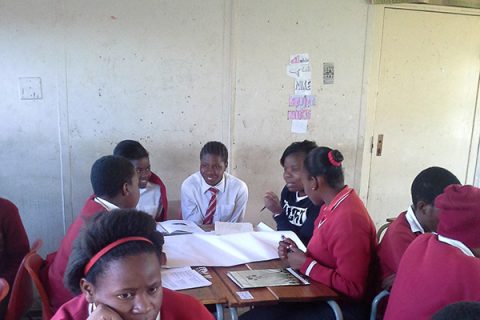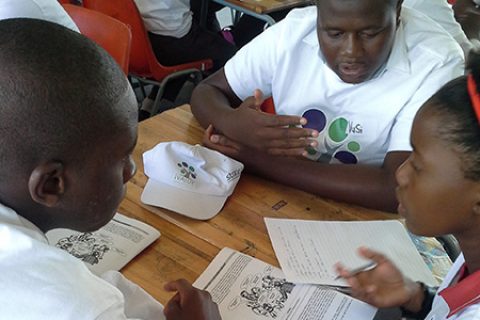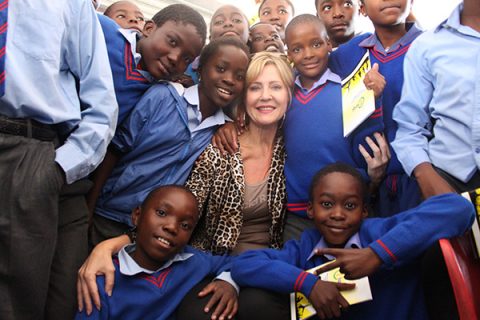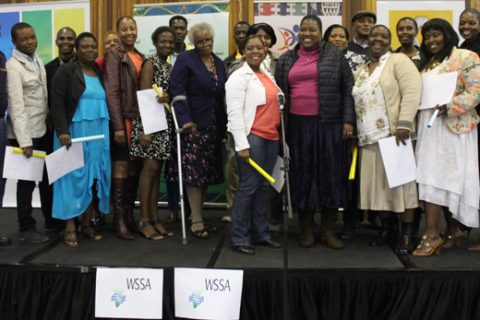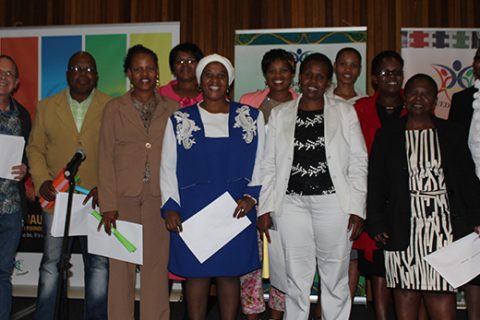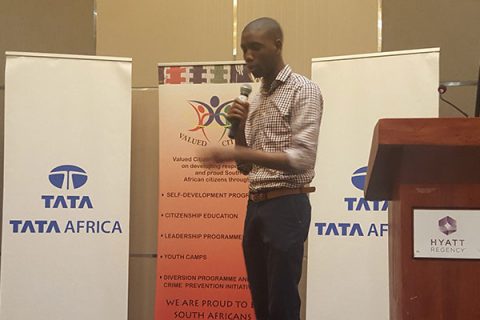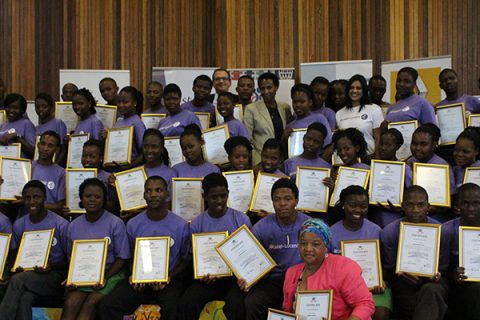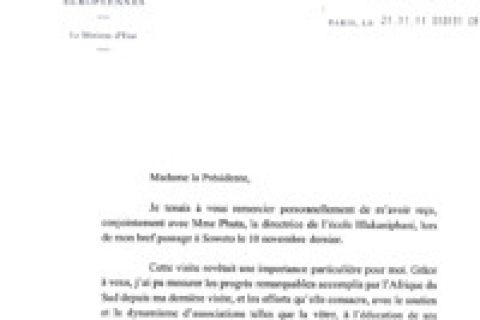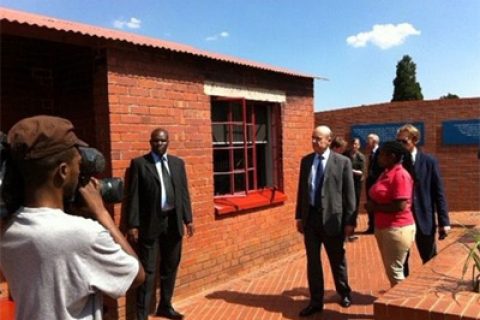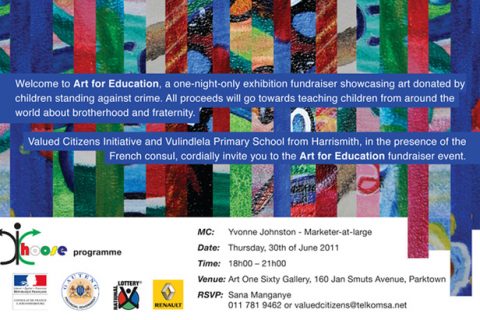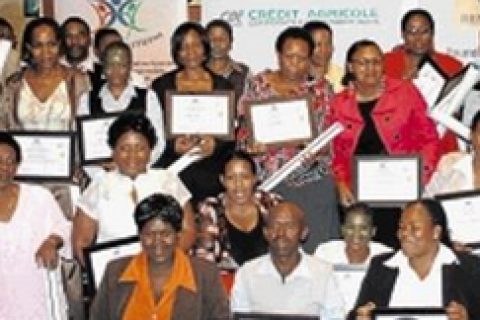 Last Year, Pepe Marais, Chief Creative Officer at Joe Public, addressed our Grade 10 learners from Kwena Molapo involved in our iVALUE entrepreneurship programme thanks to Strate.
Last Year, Pepe Marais, Chief Creative Officer at Joe Public, addressed our Grade 10 learners from Kwena Molapo involved in our iVALUE entrepreneurship programme thanks to Strate.
News & Media
 The Bridging for Life programme, endorsed by the Department of Higher Education and Training and piloted by Alcatel-Lucent, prepares learners for higher education and training with the teaching of essential life skills.
The Bridging for Life programme, endorsed by the Department of Higher Education and Training and piloted by Alcatel-Lucent, prepares learners for higher education and training with the teaching of essential life skills.
The results of the Class 2014 are: at Ikatisong Secondary School in Lethlabile township in North West and at Ponelopele Secondary School in Ivory Park, our Bridging for Life learners obtained a combined 96,2% pass rate! Well over the national pass rate of 75.8%! And 43% of our learners have qualified to enrol for a Bachelor of Arts, 47.3% have qualified for Diplomas and 1 in every 5 students who followed this two-year programme has obtained at least one distinction.
 From the 29th of March 2014 until the 2nd of April 2014, Valued Citizens Initiative led its iNSPIRE Camp, a self-development journey with eighty Grade 9 girl learners from eight public high schools from Parys and Kroonstad, thanks to NLTDF. Day one, was filled with shy personalities that were scared to get to know one another, Jessica Khenyane from Randpark Secondary School said, “It almost feels like Grade 1 all over again, I could decide to shy away or shine within”.
From the 29th of March 2014 until the 2nd of April 2014, Valued Citizens Initiative led its iNSPIRE Camp, a self-development journey with eighty Grade 9 girl learners from eight public high schools from Parys and Kroonstad, thanks to NLTDF. Day one, was filled with shy personalities that were scared to get to know one another, Jessica Khenyane from Randpark Secondary School said, “It almost feels like Grade 1 all over again, I could decide to shy away or shine within”.
 On the 11th of April 2014, Valued Citizens Initiative, together with Strate, launched its iValue Entrepreneurship programme at Kwena Molapo Secondary School, for 20 Grade 10 learners pre-selected for their entrepreneurship character.
On the 11th of April 2014, Valued Citizens Initiative, together with Strate, launched its iValue Entrepreneurship programme at Kwena Molapo Secondary School, for 20 Grade 10 learners pre-selected for their entrepreneurship character.
“I am taking home the quality of being open-minded. I believe an open-mind will allow me to listen to my customers’ needs, look at various perspectives to try what works and what does not work and develop a sustainable business”, said Hlengiwe Sithole.
 At Skeen Primary School in Alexandra, we witnessed the values of a new generation Grade 5 to Grade 6 learners taking part in our iCHANGE, Stand Against Crime programme.
At Skeen Primary School in Alexandra, we witnessed the values of a new generation Grade 5 to Grade 6 learners taking part in our iCHANGE, Stand Against Crime programme.
This programme focuses on making learners conscious of the power of decision making to free themselves from the fear of “bullies”, peer pressure and people infringing the rule of law.
“When personal and professional hardships collide, we become emotionally and sometimes psychologically drained then iSiqalo becomes a life vest,” said a victim empowerment counsellor.
iSiqalo is a professional development programme for social workers and victim empowerment counsellors that equips them with techniques to build self-esteem, trust and resilience in their clients, mainly children and families.
Pride and joy was the order of the day at the Ferndale Recreational Centre in Randburg on the 14th of March 2014. “There is little recognition given to the pillars of the nation and I am delighted to have been given the opportunity to say thank you”, said Ntoshane Mohlamonyane, a motivational speaker at the Certification Ceremony.
Valued Citizens Initiative said thank you to 179 Social workers, Auxiliary workers, Care workers, Victim Empowerment Counselors and 20 Educators for their participation in the Values in Schools and iSIQALO programmes.
How Bridging for Life programme guided my steps to reach for my dreams
 Albert Dove – Alumni
Albert Dove – Alumni
When I was asked to give a talk on how the Valued Citizens ‘Bridging for Life’ program guided me to reach my goals, I was challenged to reflect deeply on how far my life has progressed. In retrospect, I realise how far I’ve come.
I was 16 years old when I started attending the Bridging for Life program. And like most other high school learners, I never paid much attention to what the future holds, let alone to equip myself to prepare for it. All I knew was that I wanted to become an engineer and specifically, I wanted to study electrical engineering.
When Valued Citizens Initiative came to my high school at the time (Forte High School), many learners found the Bridging for Life programme slightly strange as there was no other programme that was quiet like it. One of things that were strange was that the Bridging for Life programme would run for 2 years (from grade 11 to 12).
The nature of Bridging for Life programme was very much focused on us as individuals, yet accommodating interpersonal skills. One of the examples is: we began every session with an introspection of how we feel about ourselves and also had a chance to understand how others evaluated themselves as well. I understood later that, introspection is one of the key aspects to creating success. John Wooden (one of greatest basketball coaches) wrote “without proper self-evaluation, failure is inevitable”. Steve Jobs (considered one of the greatest geniuses –former CEO of Apple) said “For the past 33 years, I have looked in the mirror every morning and asked myself: ‘If today were the last day of my life, would I want to do what I am about to do today?” And whenever the answer has been ‘No’ far too many days in a row, I knew I needed to change something”.
In any case, growing up in Soweto, and also as a high school learner, you face challenges that – at that stage – you’re unlikely unaware of. At high school level, no one really educates you with regard to soft skills, at least at a pragmatic level. This is the reality of where life starts and there isn’t much emphasis on it, one of the greatest philosophers and psychologist said (William James). “The greatest discovery of my generation is that a human being can alter their life by altering his attitude”. It is interesting to know that this is part of what valued citizen’s focuses on.
I want to share with you something I found quiet mind blowing about what I’ve had the opportunity to learn about:
The world health organization identified 10 core psychosocial skills or soft (life) skills as: Self-awareness, Empathy, Critical thinking, Creative thinking, Decision making, Problem Solving, Effective communication, Interpersonal relationship, Coping with stress, Coping with emotion. Others are based on Inner to outer circle life skills associated with mental well-being, behavioural preparedness and social behaviour.
The first and only place where I have seen these characteristics and in that particular order was on the ‘Bridging for Life’ programme. Notice that these are what many adults pay life-coaches to learn, this is what the greatest philosophers of today and of old claim to have found “The great secret to success” this is what some of the greatest bestselling authors, and famous quotes are made of. And in high school I was privilege enough to acquire those skills, thanks to Bridging for Life leadership programme.
Now how do you ensure that such skills become part of who you are? You put them through a two year programme and these lessons become part of who you are and as a result builds part of their character. These are the characteristics that today have become part of who I am.
One of the things that writing this talk made me do was to evaluate weather I’ve achieving my goals or not.
I completed my electrical engineering degree at Wits in 2015. One of my passions lay in knowledge creation through research, and so I enrolled for an electrical engineering master’s degree at Wits and currently submitting my masters’ dissertation. I’m in a masters’-studentship with the CSIR. I manage to complete these all in record time. Now, one might argue that there is not much significant achievement there, but this is quiet significant considering the success statistics in South Africa and in the world.
Some reports state that South Africa has a university dropout rate of nearly 60%, with 50 % dropping out in first year. For some perspective, there was about a 6.2 dropout rate in UK universities in 2015. In an article, Andre van Zyl (director of the Academic Development Centre at the University of Johannesburg) stated that the reason for this is merely due to a form of ‘academic Darwinism” which places an emphasis on survival of the fittest students. He also highlighted that first year transition is where the problem mostly occurs.
When I got to university, the university environment was strangely familiar, many challenges that I faced did not come as a surprise. (Examples about peer pressure, priority listing, dealing with failure). This is because I had been already well prepared for it in the Bridging for Life programme when we focussed on university, work readiness, behavioural preparedness. I was already in prepared to adapt to an environment that many individuals find extremely difficult.
If time allows:
(*To bring another perspective, in a study of the relation between psychosocial skill and university performance, it was found that there is a correlation between university persistence (retention) and ‘academic goals and self-efficacy’, and that the best predictors for GPA performance were academic self-efficacy and achievement motivation. Notice that these are some of the major psychosocial abilities that the valued citizens offers at one of the elementary lessons.*)
Am I saying university was a ‘breeze’? (*yes it was a walk in the park*). Well no, but it makes a huge difference when you’re well prepared for it. It helps close up the transition gap between university and high-school, which significantly increases my chances of success, as the studies suggest.
Valued Citizens’ Initiative was centred on leadership and becoming a leader (leading both self and others). Today I play various leadership roles (in the church-discipleship leader, at university – tutor and mentor, at the CSIR-mentor). There are many things I could list that I’ve learnt. But what I want to emphasise most is that these characteristics become part of who I am, as a result, applying these skills becomes ‘second nature’. All you see are the results of what Bridging for Lie planted in me. Today I’ve acquired new interests and new goals cantered around entrepreneurship. I’m excited to continue this journey of life and tackle new challenges in the future.
The truth of the matter is, if we want to create a generation that will lead this country into what we’ve always envisioned in the past, this programme is a perfect example of how we can groom such a generation.
 Nthabiseng Matsoso, Mookodi Senior Secondary School
Nthabiseng Matsoso, Mookodi Senior Secondary School
12 October 2017
Good day, I take this opportunity to acknowledge the presence of the representatives from:
TATA Africa Holdings, Valued Citizens Initiative, Officials from the National Department of Higher Education and Training, My fellow Bridging for Life learners from Mookodi and Namedi Secondary Schools.
Marianne Williamson once said “Our deepest fear is not that we are inadequate. Our deepest fear is that we are powerful beyond measure. It is our light and not our darkness that most frighten us .We ask ourselves who are we to be sagacious, potent, fabulous, talented and gorgeous? Actually, who are we not to be? You are a child of God. Your playing small does not serve the world. There is nothing enlightened about shrinking so that other people won’t feel insecure around you. We are meant to shine, as children do. We were born to make manifest the glory of God that is within us. It’s not just in some of us; it’s in every one of us. As we let our own light to shine, we unconsciously give other people permission to do the same. As we are liberated from our own fear, our presence automatically liberates others.”
Molweni manenenamanenekazi, ladies and gentlemen, boys and girls, My name is Nthabiseng Matsoso, grade 12 learner Mookodi Senior Secondary School, a proud Bridging For Life ambassador. Today I will be sharing the experience I gained, thanks to Bridging For Life and TATA.
Similar to the youth of 1976 who had their own battles to conquer, which they did! We as the youth of 2017 have our own mountains to climb. The youth of 1976 conquered Bantu Education, we have to conquer social ills that are terrorizing our communities. To achieve this goal South Africans should choose the path of social justice, the path of faith, the path of hope and the path of love towards our fellow men. And not stop there but share between us tools that will promote personal and collective growth for the benefit our communities and ultimately our beloved South Africa.
They say we are the future but I believe we are the present, why wait for tomorrow to change, or do great things, why wait for tomorrow to plough a seed of life, NO! I say we do it NOW. We can and we will.
Today’s youth seem to embrace failure more than success, which suggests that young people today fail to take responsibility for their lives. As youth, when facing a challenge, we sit in our homes hoping things will come to us and often when I see such a scenario play out I am reminded of a quote from our Bridging For Life manual we use in the first year, which reads, “This is a story of four people named Everybody, Somebody, Anybody and Nobody. There was an important task to be done and Everybody thought that Somebody would do it. Anybody could have done it, but Nobody did it. Somebody got angry, because it was Everybody’s job. Everybody thought that Anybody could do it. It ended up that Everybody blamed somebody when Nobody did what Anybody could have done.” This message thought me the art of standing up and take responsibility for my action, moreover to ensure that I learn from my mistake.
In most cases when people see that something is not going well in somebody’s life we often sympathize with the person, this is totally wrong, we should teach a person to be proactive towards situations and not reactive. We need to live a life that is driven by purpose, and strive to inspire those around us.
There are four factors you should look at in life to succeed: the courage factor, the gratitude factor, perseverance factor and self-discipline factor. Courage is about understanding that what happens to us depends on us. Others cannot be held responsible for what happens to us. Courage is not about the words but mainly about actions. Gratitude makes sense of our past, brings peace today, and creates a vision for tomorrow. Perseverance means having the inner dynamic and willpower to push boundaries to remain focused on our goals we have set for ourselves.
Without generalizing, young people tend to act on impulse; blurt out of feelings of happiness or anger; push boundaries and limits! To my fellow learners, we need to understand that discipline has to be learned and is acquired through the passing of time and lessons learned through life experiences. The art of patience is key.
After Bridging for Life came into my life I decided I would not want to become a statistic, being a teen and pregnant, dropping out of school, increasing poverty rates and unemployment. I am more than that, I am much better than that, I am the one to raise the flag of my country higher, by building and owning my company and create employment or better yet, become South African President in the near future.
To every one remember, life is full of adventure waiting for you to explore the world. You have to find your inner you, you are writing a book, make sure the chapters of your life in your book are how you want them to be written – to do this we must explore every opportunity, stay true to who we are, love and conquer everything, everywhere.
Failing does not mean the end of the world it means first attempt in life, it means you did not use the correct formula and you need to look back at where you made the mistake, learn from that and move forward. Mistakes happen, the fact of the matter lies on what you learn through your mistakes. Allow yourself to be different, stop copying others because we are not writing the same question paper, do not wake up someday and realize you have been writing the wrong paper your whole life. Dream big, if your own dreams do not scare you, go back to sleep and dream some more.
THANK YOU!!!!
Raudina – Bridging for Life
“When my life was quickly falling out of my hands and reality was not within reach, I felt helpless. I needed to find a way out somehow, someone or something to influence me in a better way by helping me out of the major hole I had dug myself into.
It all began when my parents separated. My siblings and I had to choose which parent we wanted to live with and when we chose mom, we lost contact with dad. I could not accept the fact that my parents were separated and that I was not going to see dad anymore. I was an emotional mess. I was angry and somehow blamed myself for their separation.
We lived with mom in an informal settlement. I was so ashamed of my home that none of my friends knew where I stayed. I did not want them to know that I lived in an informal settlement. For me, that place was not to be called my home. I started missing dad, thinking that if they were still together then I would not be living in a place I did not feel comfortable calling home. Furthermore, the ‘should haves’ and the ‘would haves’ took over my mind. I started thinking that I should have chosen to live with dad because I thought life would be better if he was around. I had much anger and no one to vent it on except my mom.
Mom got sick few months later and passed on, and still, dad was nowhere to be found. On the other hand, my siblings and I had to live separately, in three different households. Then I was even a bigger emotional mess. I figured why not drown all my sorrow on anything I could possibly find- bad company and bad habits; alcohol and staying out all night long. At that point in time, ‘bad’ was ‘good’. My grades fell tremendously and just when I was about to drop out of school, I was introduced to a program called Bridging for Life by my teacher who knew me from grade eight.
At first, attending the program was not something I really wanted. I thought, why stay in school after school to attend something that was not part of my academics. Little did I know that the program would help me out of the major hole I had dug myself into. I decide to attend once in two weeks. My teacher found out about this and promised to punish me if I were to be absent. She knew somehow that attending the program was going to influence me positively. I then started attending every Wednesday not because I was interested, but because I wanted to sign that register. That way, I would not be in trouble with my teacher.
I continued with my bad habits and as a result, I lost respect from my school mates, teachers and my family. I did not care about losing people who tried to care.
One Wednesday during the program we were asked to voluntarily share our life stories. A facilitator shared hers and one of my mates shared his. Their stories made me realize that I was not the only one who was going through the toughest time of life. On this day, we were taught how to deal with problems like the one I was facing. At that point, I realized that my life was on a downhill slant and I had to do something about it. We thereafter listened to a tape that changed my life. I can still recall the exact words of the tape as if I listened to it yesterday. The words that touched me were the following; “if you associate with eagles you will learn how to fly to great heights. The less you associate with some people the move your life will improve. It is not where you from but where you are going”.
I started loving and enjoying attending the program. It was the only place I could be myself and not be judged. I learnt to communicate my feelings, to have a good self-esteem, to choose friends wisely, and to deal with problems of life. I got emotional support and it was seen to it that my siblings and I lived in one household. Everything fell into place. I changed friends, changed my bad habits, studied and passed my grade eleven with excellent grades.
Since Bridging for Life was a two year program, I continued attending it in grade twelve. I was one of the motivated bridging for life learners. I was encouraged to study and learnt to work with other people. I also learnt to forgive. Forgiveness was not part of the topics we learnt about in the program but I leant it through stories we shared with each other, and through working with other people. I forgave dad, for everything. I passed grade twelve and with the help of my facilitators and everything I learnt from the program, I was finally out of the hole I had dug myself into.
Still no word from dad, today I am a second year Education student at Witwatersrand University. I am doing well and I am enjoying my studies. After all, I am doing what I truly love; Teaching. I thank Valued Citizens Initiative for Bridging for life program and all other programs. My advice to all who are going through the toughest time of life; Difficulties do not come to destroy you but to help you realize your hidden potential. Let difficulties know you are difficult to defeat.”
Chico Mawayi – Valued Citizens Learner from Bridging for Life programme 2010 – 2011 SG Mafaesa High School – Kagiso
“When Valued Citizens Initiative came to my school S.G Mafaesa, I was still a seed, that needed to be taken care of before it start to germinate, I was really inspired by Valued Citizens through my participation, interacting with my fellow learners and the information that they fed us with, through the activities that we were given, I personally developed the courage to open up, to feel free, to be positive towards life, furthermore I developed the courage to want to explore more, to become better in life.
Yes, I confess things were not easy back then, I am not saying that they are easy now, but through keeping faith in God, our divine being, listening to my parents, personally dedicated in what I was studying, I managed to hold on, despite the background I am from, the place am from, a wise man once said-“In life it does not matter where you come from, but where you going matter.”
To my fellow brothers and sisters, I am not a genius, I do not even believe in the so called person called a genius in this world, but through God, hard work, inviting God in everything you do in life, you shall prosper, yes I confess I made a lot of life turns, some wrong and some right, I had my down fall in life but to mention few, my first year in 2012 at UJ was hectic, I was travelling from home to UJ using Putco bus in the morning as it left early 05h30 and returned around 17h30, since the Putco bus was cheaper and my parents could only afford it, due to the fact that they were paying for my fees. I had to adapt to the new environment, I failed a module, but I thank God for my precious, loving, caring parents they never gave up on me, I paid them back by passing my first year.
I applied for nsfas and I got approved, during my second year I was staying at school, things became a lot easier, because I had too much time to study unlike my first year, my time was consumed during travelling. I maintained my performance, furthermore I even increased my performance, I passed my second year, again I applied for nsfas and I got approved and did my third year, to tell you the truth last year it was rough for me, I had roommates who were bad, never cared about studying or about my studies.
I work hard until my personality split,I managed to pass my final year and in addition got a distinction on my major. This year I am going to further my studies in doing my Post Graduate Studies (PGCE), well life is not predictable as we plan it, not everything goes according to the way we plan, but we got to hold on tight to the ride, as I already said this year I am doing my Post Graduate studies, but am currently having financial problems. I have faith in God that if He can bring me through it, He shall take me through it.
Now I got my Psychology Degree, I made many folks, parents, my siblings, my life mentors from Valued Citizens, my fellow brothers and sisters proud when I told them that I am graduating on the 16th April 2015.
Being a Valued Citizen learner, as far as I can see, I’ve made it to the threshold, Lord knows I’ve waited for this a lifetime, I am inspired by the challenge that I find myself standing eye to eye with. I am praying for better days, people love de glory but scared of de story to be revealed to them, I say to all my brothers and sisters know that you can conquer all with a plan, forget about the negatives buried in the sand, never forget this is your life your path, your dream, this is your fight.
Victory you will see, you will be alright, get through the darkness, on the other end is pure light. Make a change and find a place in your heart you trust, never let your circumstances hold you back. You were born free, never got to feel trapped and on the pursuit to happiness you are going to feel pain, but I’ve learned that the struggle builds character.
My parents do not have much but through sacrifices that they did for me, they managed to provide me decent education, I paid them by being a good child, and obtained my Psychology Degree at UJ.
My best quote for my brothers and sisters out there is –
“If you’re trying to achieve, there will be roadblocks. I’ve had them; everybody has had them. But obstacles don’t have to stop you. If you run into a wall, don’t turn around and give up. Figure out how to climb it, go through it, or work around it.”- Michael Jordan
I am not trying to preach, but giving a testimony about my life and thanking God for Valued Citizens Initiative, their support as I believe it changes people’s lives out there.”
From an Educator
“I have been serving in the Free State Department for 19 years. Values in Education is categorized as curriculum support. We support educators, learners; we even go to an extra mile in involving parents and other stakeholders in making sure that we mould and assist the young generations to become Valued Citizens that the Constitution talks about” – Patrick Thukwayo, Assistant Director of Values in Education, Fezile Dabi, April 2014.
iNSPIRE programme
“When you undergo a life changing experience where you learn about yourself, you feel like you can change the world; you flourish with confidence and enthusiasm.” Rethabile Motale, beneficiary of the iNSPIRE programme from Thakamiswa Secondary School in Free State, April 2014.
iNSPIRE Programme
“The iNSPIRE Programme improved my life now I see myself as a leader and play that leadership role at school. I am able to accommodate someone different from me and know how to handle challenging situations as a leader.
Valued Citizens Initiative is different because they still stayed in touch with us, and that stood out for me, they really care and support us through the years. If it wasn’t for the iNSPIRE camp, I would not have discovered the independent girl that I am.” Angela Myeza, beneficiary of the 2010 iNSPIRE programme from Dikana Secondary School in Ulundi, KwaZulu-Natal, interview March 2014.
Siyakhula Programme
“Our Siyakhula Programme has enabled me to stand up for myself and for what I believe in so I make wiser decisions. It has improved my self-esteem; I do not compare myself to anyone. I am now after four years, studying radiography at the University of Johannesburg.” Tumi Sebola former Siykhula beneficiary from Zitikeni High School, Tembisa, April 2014.
iCHOOSE programme
“I obtained Matric and I want to compose the beat of my life not just survive. Valued Citizens Initiative taught me to take pride in who I am and what I do. At this time, I use every opportunity to learn to act on my desires. I have not given-up and wish Ms Carole Poddetti-Ngono that you could be my mentor and guide me further in directions that I have not been able to travel by myself just to show me the way… so I can build the bridge myself!” Ndumiso Yende beneficiary of iCHOOSE programme in 2010, words written May 2014.
Bridging for Life 2013
“I believe that Bridging for Life programme will have a huge impact in my life as I believe in this say that says “to be a one day leader starts by building a foundation.” I regard Bridging for Life programme as a foundation of my career and future.” Tumelo Lehong, Ponelopele Oracle Secondary School
“Bridging for Life Programme will assist me to focus on my dreams and goals in life, moreover build my qualities as a learner. My ultimate goal is to become a role model in my community and ensure that young people are inspired.” Mmatumelo Innocent Mpete, Ikatisong Secondary School
“As a young girl being raised by single parent, I find the Bridging for Life programme relevant to me, because it will allow me the opportunity to voice out my ideas and concerns. Sometimes it is difficult to discuss my challenges with my mother or my friends so I see this programme as a solution to my needs as a girl child.” Maloga Morema, Ponelopele Oracle Secondary School
“Bridging for Life will restore my hope and motivate me to focus more on improving my school work. This will assist me to achieve my goals in life, especially the one of becoming a doctor.” Matsinye Katlego, Ikatisong Secondary School
Inspire Uthungulu District 2013 Learners
“The iNSPIRE Programme has made me realize how important I am as a girl, to believe in myself and through it all it taught me that working as a team make us achieve more.”
“The journey has helped me to turn my weakness into strength e.g. standing in front of people. I have learnt that I should not allow my family background to define my future; I have the power of choice to be who I want to be in the future.”
“The most important thing that the iNSPIRE Programme taught me is that love is not about sex, as a girl I have a right to say “NO” with confidence.”
“The iNSPIRE Programme made me realize that I cannot change my past but I can look back and acknowledge my mistakes, learn from them and move on with my life.”
“Through the journey I realised how important is honesty and how one can fit in a team without compromising my values. I have learnt to listen with my heart, trust myself in order to be able to gain the trust of the others.”
Educators
“The iNSPIRE Journey gave me a better understanding of how to read my learners’ feelings and how to instil morals in them.”
“The iNSPIRE Programme motivated and made me grows as an educator, now I have skills on how to handle and interact with my learners.”
“My communication skills have improved a lot and will make it easier for my learners to understand me and in return understand them.”
“The iNSPIRE Programme gave me the opportunity to meet new people, it taught me to accept myself first as a human being and others as well as their differences. I have learnt to accept things I cannot change in order to be happy in life, generally at home and work.”
“The camp exposed me to various methods of exploring my feelings; struggles at work and home and it re-in forced my vision as an educator.”
“We would like to thank you for your continued support through your very important programmes for our learners. Please do not get tired because you are able to touch a lot of our learners and bringing out the best in them. You continue to help them in overcoming their difficult background through planting a seed of hope and self-belief. May you grow from strength to strength.”
Tsibana Seabi
Gauteng Department of Education
Values in Education Coordinator
 Valued Citizens Initiative equips learners with life skills in 12 public high schools through 3 different programmes. The focus is on instilling in learners a sense of self-discipline, determination and courage when tackling, what might seem to them, insurmountable challenges.
Valued Citizens Initiative equips learners with life skills in 12 public high schools through 3 different programmes. The focus is on instilling in learners a sense of self-discipline, determination and courage when tackling, what might seem to them, insurmountable challenges.
Madame la Présidente,
Je tenais àvous remercier personnellement de m’avoir reçu, conjointement avec Mme Phuta, la directrice de l’école Hlakaniphani, lors de mon bref passage à Soweto le 10 novembre dernier.
Cette visite revêtait une importance particulière pour moi. Grâce à vous, j’ai pu mesurer les progrès remarquables accomplis par l’Afrique du Sud depuis ma dernière visite, et les efforts qu’elle consacre avec le soutien et le daynamisme d’associations telles que la vôtre, à l’éducation de ses enfants.
Par Vincent Hugeux
Le ministre français des Affaires étrangères et européennes a entrepris hier jeudi une excursion africaine qui le conduira successivement dans la patrie de Nelson Mandela puis au Nigeria.

A son arrivée ce jeudi matin à Pretoria, la délégation française comptait a minima deux marathoniens aguerris: le directeur Afrique du Quai d’Orsay, Stéphane Gompertz, surnommé paraît-il “Running Man” par les Ethiopiens au temps où il servait comme ambassadeur à Addis Abeba; et le porte-parole du ministère des Affaires étrangères et européennes Bernard Valero, naguère familier du bitume parisien ou new yorkais. Au soir de cette course sud-africaine en dix étapes, un troisième coureur de fond méritait à l’évidence de rejoindre ce club fermé: Alain Juppé lui-même. Dieu quelle cavalcade, à peine apaisée par la mauve douceur des jacarandas…
D’ordinaire, les petits retards empilés au fil des heures finissent par dynamiter un programme bourré jusqu’à la gueule. Cette fois, il n’en fut rien: on enfila les rendez-vous avec une précision et une minutie d’horloger. Le seul report à la nuit tombée? Imputable au président Jacob Zuma, dont il fallut attendre le retour du Cap. Contretemps employé utilement: l’adresse à la communauté française, réunie sur pelouse et sous chapiteau à la résidence de France, fut avancée. Au passage, on servit aux compatriotes du champagne Barnier; mais sans doute serait-il abusif de voir là un pétillant hommage à celui qui, prénommé Michel, fut au Quai le successeur et le prédécesseur de l’hôte du jour.

Bien sûr, le strict respect de la partition suppose de recourir à l’allegro vivace protocolaire: six minutes chrono en main, interview-éclair avec une télé locale comprise, pour la visite d’une banque de micro-crédit épaulée à Soweto, township fameux en lisière de Johannesburg, par l’Agence française de développement (AFD). Et pas davantage pour l’inauguration du compteur d’eau d’une certaine Mme Lettie, bénéficiaire d’un projet financé lui aussi par l’AFD. C’est au fond la loi du genre. La diplomatie s’apparente parfois au patinage artistique. Des figures libres, plutôt rares, et pas mal de figures imposées. Au premier rang desquelles, il va de soi, la visite commentée de la maison-musée de Nelson Mandela, icône canonisée de son vivant.
“Déni de réalité et rhétorique fossilisée”
Le décathlon austral du ministre d’Etat avait commencé par une épreuve initiatique moins conventionnelle: la rencontre au QG de Luthuli House avec l’état-major de l’African National Congress (ANC), hier fer de lance du combat contre l’apartheid, aujourd’hui parti dominant dont la suprématie s’effrite. “Brutal et chaleureux”, confie un témoin. Viril mais correct, lâcherait en écho le talonneur de Bordeaux-Bègles. Gwede Mantashe, secrétaire général de l’ANC et patron du PC sud-africain attaque bille en tête sur le front libyen. Résumons: vous avez assassiné Kadhafi -traité ici avec les égards dus au héros-et-martyr-, mais aussi des cohortes de civils innocents; il fallait négocier; c’est à la seule Union africaine qu’incombait la mission de régler cette affaire africaine. “Déni de réalité et rhétorique fossilisée”, soupire un conseiller d’Alain Juppé. La suite tend à lui donner raison. Pour desserrer l’étau de ses revers économiques, l’Occident, France en tête, aurait entrepris de “recoloniser l’Afrique”. Même topo sur la tragédie syrienne: les vétérans de la lutte contre le racisme d’Etat endossent grosso modo les thèses de la clique alaouite de Damas. Moralité: les combattants de la liberté vieillissent mal, en général.
Pendant ce temps, six étages plus bas, devant une forêt de caméras et un buisson de micros, le président de la commission de discipline de l’ANC, Derek Hanekom, égrène les griefs retenus contre Julius Malema, le caïd à peine trentenaire de la Ligue de la Jeunesse du parti. Un démagogue au train de vie de nabab, vénéré par les naufragés du rêve arc-en-ciel, et dont les harangues incandescentes exaspèrent l’ami Zuma. Verdict: cinq ans de suspension, même si l’intéressé a deux semaines pour interjeter appel. Moralité-bis: en général, les boutefeux populistes vieillissent mal très jeunes. “Comrade Julius”, encore surnommé ” Juju ” par ses disciples, captera-t-il le message? Ses censeurs n’ont rien laissé au hasard: ils ont flanqué Hanekom d’un traducteur en langage des sourds-muets.
Interro surprise
A cet instant, on éprouve un intense besoin de fraîcheur. Besoin assouvi entre les pupitres de l’école Hlakaniphani – “Devenir intelligent”-, logée elle aussi dans la South Western Township (Soweto), où opère une association fondée en 2001 par la Française Carole Podetti. L’initiative “Valued Citizens” vise, comme son nom l’indique, à enseigner les valeurs de la citoyenneté et du patriotisme aux élèves de quartiers déshérités, ravagés par la misère, le chômage et le sida. “Good Morning, Learners! “, lance l’institutrice. “Good Morning, Educator! “, répliquent en choeur la trentaine de gamins vêtus de jaune ou de bleu. Suit une cascade de questions. Qu’est ce que la démocratie? Réponse: le gouvernement du peuple, par le peuple et pour le peuple. Où a-t-elle vu le jour? En Grèce, ce pays tant célébré pour ses vestiges et désormais en ruines (là, c’est moi qui brode). Quels sont les droits et les devoirs du citoyen?

Installé au fond de la salle, le professeur Juppé n’échappera pas à l’interro.” Combien la France a-t-elle connu de constitutions depuis 1789?” La colle. “Il va falloir calculer.. ” Mais “Amstrad” -le surnom que lui valurent à l’âge du tableau noir sa mémoire et son brio de premier de classe- a de la ressource. Il s’en tire avec la lignée des républiques bleu-blanc-rouge et les avatars de la Ve. La suite du quiz? Fastoche. Combien de niveaux de gouvernement? Y a-t-il chez vous une cour constitutionnelle?
Plus tard, autre classique du genre, l’inauguration des nouveaux locaux de l’Institut français de Jo’bourg, en présence du chanteur Johny Clegg, francophile impénitent. Au moment de dévoiler la plaque commémorative, habillée d’un carré d’étoffe rouge, le maire de Bordeaux se montrera un peu plus prompt que son homologue du cru. De là à dire qu’il tire la couverture à lui…
“Le peuple sud-africain pourrait-il rester sourd à la détresse des Syriens?”
Cap maintenant, toujours au pas de charge, sur le South African Institute of International Affairs (SAIIA), prestigieux think tank. Là, Alain Juppé délivre, en anglais, un discours charpenté sur la “nouvelle gouvernance mondiale”. Sans pour autant escamoter l’actu. Pour preuve, cette référence explicite au régime de Bachar al-Assad, dont Pretoria a refusé de condamner les exactions au Conseil de sécurité de l’Onu: “Le peuple sud-africain, assène-t-il, est l’héritier du combat de l’ANC, qui fit appel à la communauté internationale pour sanctionner les actes de la petite minorité qui bafouait les droits fondamentaux de l’homme. Pourrait-il rester sourd à la détresse des Syriens et rester passif face aux crimes contre l’humanité commis dans leur pays?”
Suit une nouvelle séance de questions-réponses, moins enfantine celle-là. On y évoquera pêle-mêle Djibouti, le Somaliland, le Rwanda, l’ex-Zaïre et l’Eurozone. “A quoi ressemblera l’Europe dans une décennie?”, s’enquiert l’ambassadeur d’Autriche. “J’ignore ce qui se passera demain, esquive l’orateur. Il est sans doute moins risqué de prédire ce qui adviendra dans dix ans.”
Le marathon version Springboks s’achèvera quelques heures plus tard sous un ciel festonné d’étoiles, autour d’un tagine d’agneau. Cinq siècles avant notre ère, le vaillant soldat Philippidès avala au pas de course la quarantaine de kilomètres séparant la plage de Marathon d’Athènes, histoire d’annoncer aux siens la victoire sur les Perses. Puis, le devoir accompli, il s’effondra et périt d’épuisement. Gageons que “le meilleur d’entre nous” -Chirac dixit- songe à d’autres triomphes et qu’il envie moins le destin du messager que sa foulée.
Welcome to Art for Education, a one-night-only exhibition fundraiser showcasing art donated by children standing against crime. All proceeds will go towards teaching children from around the world about brotherhood and fraternity.
Valued Citizens Initiative and Vulindlela Primary School from Harrismith, in the presence of the French consul, cordially invite you to the Art for Education fundraiser event.
Six Gauteng public schools have recently embarked on a bold initiative called Stand Against Crime, with the aim of curbing the crime and violence which dominate many urban schools.
With a recent study by the Centre for Justice and Crime Prevention showing that 15.3% of all SA learners (1,821,054 children) experience some form of violence at school, Stand Against Crime is a welcome initiative aimed at creating safer, more positive school communities.
Initiated in February 2011 by Valued Citizens Initiative in partnership with financial services company Computershare, Stand Against Crime mobilizes learners to initiate crime prevention activities within their schools with their Ambassadors, diverted children who have attended a six month leadership programme named iCHOOSE To Change A Life. The initiative is run by pupils at six primary and secondary public schools with the guidance of educators and Valued Citizens Initiative facilitators through a series of open dialogues.
Over 200 public schools educators from Gauteng Province will be awarded with the Valued Citizens Certificate for their efforts and commitment in serving the educational course; at the Hyatt Regency, Rosebank; on the 25th February 2011.
The occasion will mark the educators’ successful completion of the Values in Schools programme, which aims to empower educators with skills to respond effectively towards the day to day challenges they encounter in their profession. The whole school approach of the programme boosts confidence, develops work ethics and team work and ensures the practice of positive creative thinking to enable educators not to be just transmitters of information but facilitators of knowledge useful for a child to become a responsible South African Valued Citizen.
 THESE are some of the more than 200 teachers from public schools in Gauteng who have just been given Valued Citizens Certificates for their efforts and commitment in serving the educational cause.
THESE are some of the more than 200 teachers from public schools in Gauteng who have just been given Valued Citizens Certificates for their efforts and commitment in serving the educational cause.
They have completed the Basic Education Department-endorsed Values in Schools Programme.
It empowers teachers with skills to effectively handle the daily challenges of their profession, by boosting their confidence and developing their work ethics.
Change a Life Day, a community-driven initiative against crime to be held on Saturday 24 July in Cosmo City north of Johannesburg, aims to capitalise on the goodwill created by the successful FIFA World Cup.
Building on the sense of unity fostered by the World Cup, Change a Life Day will use soccer as a theme to unite the Cosmo City community against crime. Cosmo City historically suffers from one of the highest rates of crime in South Africa, with children as young as ten years old entangled in criminal activities such as house-breaking, shop lifting and drugs.
UNESCO (United Nations Educational, Scientific and Cultural Organization) is particularly committed in eliminating all forms of discrimination against women, and establish equal rights for women in their daily lives, regardless of their marital status, in all fields – political, economic, social, cultural and civil. In the last two years, we have witnessed the development of policies in the global community in increasing the representation of women in the spheres of business and government – for instance the question of quota in the Boardrooms occurred in France last year.

